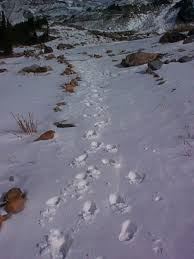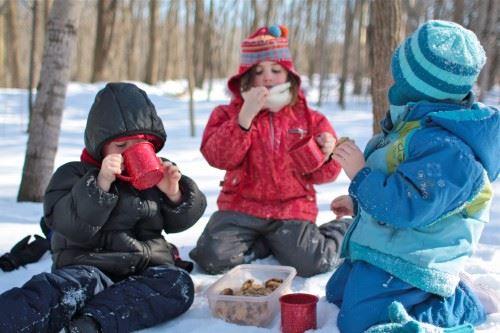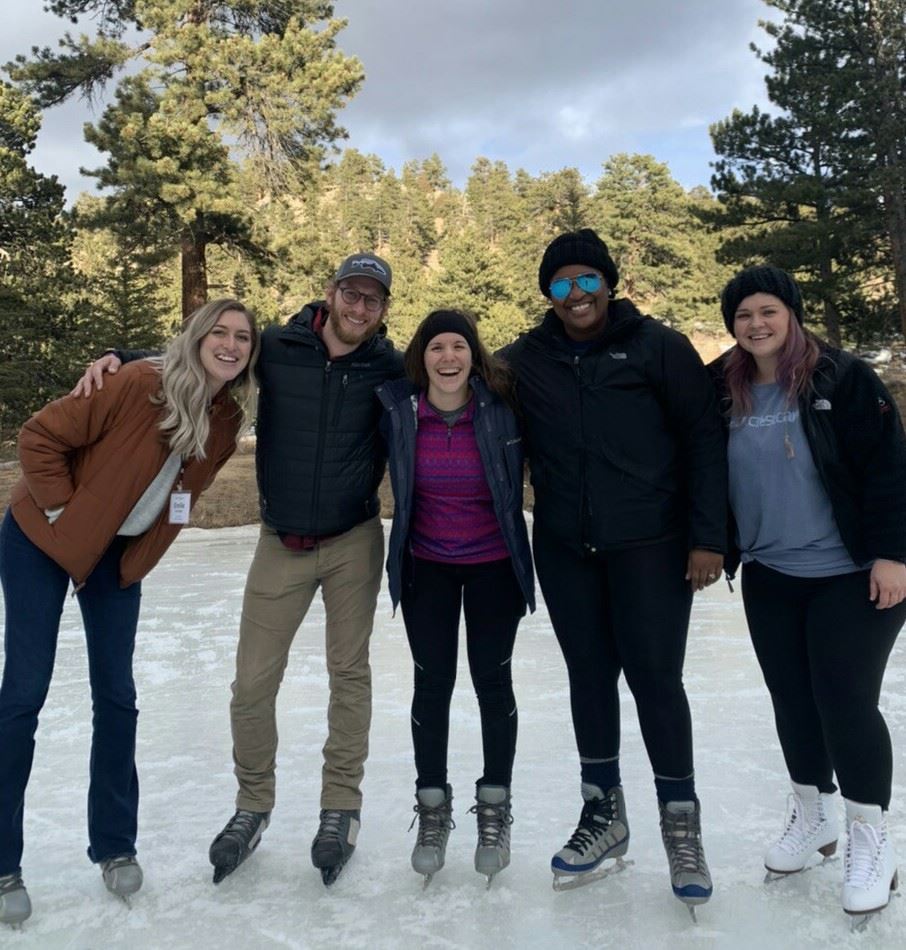At camps and retreat centers, summer and the spring and fall “shoulder seasons” are usually wonderful times to enjoy outdoor activities on our waterfronts, fields, and trails. Worship is held in outdoor chapels and open-air shelters host meals and crafts. When cold weather arrives, as it does for the majority of us in the U.S., many centers have traditionally shifted programming indoors to cozy fireplaces and heated, electric-lit gathering spaces. However, in this pandemic year, even those sites that can safely and legally open are having to re-think the use of indoor spaces.

As an appreciator of winter, I want to encourage you to “think outside” the buildings! Winter is an amazing season for outdoor adventures in serene snowy landscapes with less sweating and no bugs. You might even get some much-needed vitamin D from the sunshine and happy neurotransmitters from invigorating exercise. I hear some of you whining already, though. I want to encourage you to practice the skills of regulating your body temperature so you can help yourself and others experience God’s creation through this winter season. Don’t let the pandemic get you down— fresh air and wide open spaces are still out there for us to enjoy.
Layering – not just a fashion statement
One key to staying warm while active in cold-weather activities is, ironically, not getting too warm. Overheating leads to sweating, which can lead to chills or even hypothermia. If you’re active in the cold weather environment, you need layers you can strip off and add back to keep your body in the comfort zone. I see you, Floridians, trying to just wear your same summer t-shirt and pop a big heavy winter coat on top. Better to start with a thin, wicking layer that’s not cotton. Synthetic workout clothes or wool base layers work great. Not just the top, but bottom, too—long johns or leggings. Next, add a light fleece or other mid-weight shirt. Then a warm jacket (but not too heavy or bulky if you’re going to be active). This is a great use for those down or synthetic puffy jackets that squish down small. Wear or pack a waterproof or water-resistant outer layer for the very top – you’ll be glad to have it in case of wind or precipitation. Again, not just for your upper body—you’re done if your legs and behind get cold and wet. Even if you don’t need them when you start out, throw a pair of snow pants or rain pants in your pack to be prepared.
 Hydrate or die-drate
Hydrate or die-drate
When it’s cold you might not feel thirsty like you do in warm weather, but your body needs hydration as much or more than ever. Cold temps can be drying both to exposed skin and to your insides. A thermos with warm tea or cocoa can be a welcome treat that’s worth the weight. And bring plenty of water – nestle it inside your pack or use an insulated bottle if you’re concerned about freezing.
Fuel the fire
Bring lots of snacks, as those calories help your body generate heat. Bonus—things won’t melt, so you have more options than your usual hot-weather fare (yes, please, more chocolate and cheese!) If you’re in sub-zero temps, beware of freezing – hard granola bars and Power Bars may become an inedible brick, so nut mixes or bite-size items might be a better bet.
Don’t pack too light
You might need a bigger pack in the winter. If you’ll be in a remote area or out for the whole day or (for the brave!) overnight, you’re going to need more stuff. Make sure you have one more warm layer than you expect to use in case the weather shifts unpredictably, a layer gets wet, or you need to sit still. Leave room for layers you’re wearing that you might want to shed once you get moving.
 Take it easy
Take it easy
If you are going to be hiking, playing active games, sledding, skating, or skiing, start slower than your ideal pace. You want to be warm but not sweating profusely. Adjust your layers once you get going. Make sure the layers you shed get put somewhere safe (like back in a pack) so they’re dry and easy to find when you’re ready to put them back on. It’s no fun to look for the lost mitten once it’s getting dark and your fingers are cold.
Head…and Toes
Give special attention to cold-weather protection for your head and extremities. A warm hat like a fleece or wool beanie is essential (not optional; your hairdo is less important than your health and warmth!) A balaclava and/or neck gaiter can be a face-saver in sub-freezing temps or windy conditions. Gloves are also a must—I like a warm fleece pair with waterproof mitts on top, but regular snow gloves will work if that’s what you’ve got. Even if you don’t plan to get them wet, have a backup plan. You never know when you might need to make a surprise snowball. I like a two-layer approach to socks, as long as my boots still fit comfortably (air space is an insulator, so don’t squeeze your feet with socks that are too thick). Itch-free smartwool is wonderful, but most types of hiking socks work well (remember, no cotton!). Stash a backup pair of socks in your pack. If you (or your campers/guests) don’t have waterproof boots and your winter wonderland is wet, consider a plastic produce bag or bread bag as a waterproof liner between sock feet and sneakers. Not ideal, but neither are cold, wet feet.

Rest assured
For rest breaks in summer, we can often plop down on the ground or find a handy rock. In winter a little more planning is needed. For a quick snack or water break, you might want to stay on your feet. If you’re taking a longer rest, sit on your pack or make an insulating seat with a tarp and your spare layers. Don another layer of clothing, too, as it’s easy to get a chill once you stop moving.
This same principle applies if you are doing a “sitting still” activity outdoors in the cold, like a worship service, lesson, or meal. Lawn chairs, outdoor chapel benches, or picnic table seats need a layer of insulation to sit on—foam sleeping pads, blankets, or an extra jacket can work; just make sure your participants come prepared. Some may also want a blanket for their shoulders or lap. Older adults and very young children tend to chill faster, so let their comfort be your guide and bring extra items to care for their needs.
 Sun still shines
Sun still shines
If you are lucky like me to live in a place where the sun shines in the winter, you will need to remember your sun sense. You may have seen those ski-goggle sunburns – sun reflected off of snow or ice can be intense. Wear sunscreen on your face and lips, and protect your eyes with sunglasses or goggles. You may want to pack a ball cap or other brimmed sun hat to trade out if your beanie or hood gets too warm. Because of the low angle of winter sun in our hemisphere, adjust your schedule to maximize your daylight. Once the sun sets, everything gets a LOT colder. Where in summer you might prefer an evening worship or shady green cathedral, in winter you’ll want to relocate outdoor events to the sunniest (warmest) spot and schedule for maximum daylight.
Plan for quitting time
Head homeward before you (or your group’s most vulnerable member) get too tired or cold. Don’t wait until you’re hours down the trail or it’s getting toward dusk before making your return plan. Even if your group will disperse for the ride home, consider offering warm beverages and snacks with a quick closing prayer back at base camp so everyone can head home content and happy.
For our physical and mental health this season, we’re going to need to spend more time outside. I hope these tips will help you enlarge your zone of comfort to embrace a new outdoor adventure. Regardless of climate zone, I hope more of us will consider a hike on a peaceful gray winter day or a socially-distanced outdoor worship in our site’s sunniest spot.

Jen Burch is the UMCRM Association’s Administrator, which is pretty much a sedentary desk job. Many years ago, though, she graduated from a January course at the Colorado Outward Bound School (including 9 continuous days in the same base layers and a two-night solo in a quinzhee snow cave.) Jen still loves snow and hopes to spread appreciation for the unique treasures of the winter outdoor environment.

